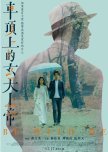A Messy Love Triangle Overpowers a Love Letter to Family, Faith, and Home.
Fu Yue, Ariel Lin, is an established art director for film. While on set of her latest project, she abruptly leaves to return to her hometown of Chaiyi. Her terminally ill father has decided to stop all treatment for his disease and remain home to live out his final days. This sudden interruption of her hectic work life offers her the opportunity to reflect not only on herself, but on her Grandfather Nikko, Vic Zhou, who was instrumental in creating the woman she is today.
Be With Me tells the semi-autobiographical and deeply personal story of legendary art director and first time director Hwarng Wern Ying’s family across three eras of Taiwan: 1940s Japanese Colonization, the 1980s Economic Boom, and Present Day. Originally conceived in 2005, this passion project of Hwarng Wern Ying took nearly twenty years to complete.
In 1940s Chaiyi, Nikko must hid the family’s beloved Xuan Tian God figurine from the Japanese Government. It’s the Kominka Movement, which sought to eradicate all Chinese and Taiwanese culture, language, and religion in Taiwan. Despite this oppression from the government, Nikko is a kind and generous man who opens a Ryokan across the street from Chaiyi’s Train Station. This is where he can offers sanctuary and respite to anyone who seeks it, regardless of age, ethnicity, or financial background.
During the 1980s economic boom, Nikko is now an affluent figure in Chaiyi who has time and money to spare. He now spend his days with his favorite grandchild, Fu Yue, and spoils her rotten. Taking her to five star restaurants with his business partners, as well as private auctions of rare Chinese antiques. These experiences taught Fu Yue to appreciate the finer things in life, as well as trained her to have a discerning eye for beautiful craftsmanship. All of these precious moments with her grandfather laid the groundwork for her future career as an art director.
In the present day, Fu Yue is a contemporary woman struggling to define who she is. Though soft spoken and quiet, she is incredibly strong willed and takes pride in her work. This inexplicably leads to heated arguments with the director and producer of her current film. Her love life is equally tumultuous; pursued by a man who loves her whom she does not love in return, whilst at the same time in love with another man with a wife and child. Mr. Yu, Ethan Juan, is a shrewd businessman who always gets what he wants, and right now he wants Fu Yue. A chance encounter drew them together, and since then Mr. Yu has been chasing Fu Yue all over Taiwan. Chun Shan, also played by Vic Zhou, is a famous architect whom Fu Yue has hired to renovate her historical home in Taipei. Throughout the design process, Chun Shan’s personality and demeanor reminds Fu Yue of her Gandfather Nikko. Before she realizes it, she has fallen in love with Chun Shan and begins a passionate affair.
To capture the essence of these three distinct eras, Hwarng Wern Ying had an ace team of award winning cinematographer and composers to bring her vision to life. Cinematographer Yu Jing Ping utilized unique framing techniques, lenses, lighting, and coloring for each era. Not only did this enhance the feeling of being transported back to a specific time in history, but also to a distinct time in cinema’s history. To round out the experience of traveling back in time, composers Lim Giong, Summer Lei, and Yang Wan Chien dug deep into the music archives to find songs and pieces critical to encapsulating the feeling of living and thriving in each time period.
Ariel Lin may get top billing as the main protagonist Fu Yue, but it’s Vic Zhou who is doing all the heavy lifting here. Not only is he playing two roles, Grandfather Nikko and Chun Shan; but he also appears in all three eras speaking three languages: Japanese, Taiwanese Hokkien, and Mandarin. Hwarng Wern Ying, wrote the dual roles specifically with Vic Zhou in mind. Although Vic Zhou is not a native speaker of Japanese or Taiwanese Hokkian he whole heartily threw himself into this production. Even though he spent months working with dialect coaches to perfect his Japanese and Taiwanese Hokkien, native speakers may be a bit distracted be his pronunciations in those scenes. Still a commendable effort nonetheless.
Originally intending to only tell a story between a granddaughter and grandfather, Hwarng Wern Ying ultimately decided to add a romantic element to make the film reach a wider audience. For that part of the script she tapped in her two college roommates: Chen Hsiao Wen and Yang Yi Chien. Unfortunately, this added drama completely distracts from this touching tribute to Hwarng Wern Ying’s grandfather and Chaiyi. The plot distinctly felt like Hwarng Wern Ying wrote all the scenes about Grandfather Nikko; Chen Hsiao Wen and Yang Yi Chien then wrote all the romantic scenes; and at no point in the process did the three come together to merge the two into one cohesive story. It was like each story line was its own car driving down a road, then you as a passenger must jump back and forth between the two cars in order to get to your destination. You may have gotten to the end, but you’re completely exhausted and question if it was worth the effort to get there.
Be With Me tells the semi-autobiographical and deeply personal story of legendary art director and first time director Hwarng Wern Ying’s family across three eras of Taiwan: 1940s Japanese Colonization, the 1980s Economic Boom, and Present Day. Originally conceived in 2005, this passion project of Hwarng Wern Ying took nearly twenty years to complete.
In 1940s Chaiyi, Nikko must hid the family’s beloved Xuan Tian God figurine from the Japanese Government. It’s the Kominka Movement, which sought to eradicate all Chinese and Taiwanese culture, language, and religion in Taiwan. Despite this oppression from the government, Nikko is a kind and generous man who opens a Ryokan across the street from Chaiyi’s Train Station. This is where he can offers sanctuary and respite to anyone who seeks it, regardless of age, ethnicity, or financial background.
During the 1980s economic boom, Nikko is now an affluent figure in Chaiyi who has time and money to spare. He now spend his days with his favorite grandchild, Fu Yue, and spoils her rotten. Taking her to five star restaurants with his business partners, as well as private auctions of rare Chinese antiques. These experiences taught Fu Yue to appreciate the finer things in life, as well as trained her to have a discerning eye for beautiful craftsmanship. All of these precious moments with her grandfather laid the groundwork for her future career as an art director.
In the present day, Fu Yue is a contemporary woman struggling to define who she is. Though soft spoken and quiet, she is incredibly strong willed and takes pride in her work. This inexplicably leads to heated arguments with the director and producer of her current film. Her love life is equally tumultuous; pursued by a man who loves her whom she does not love in return, whilst at the same time in love with another man with a wife and child. Mr. Yu, Ethan Juan, is a shrewd businessman who always gets what he wants, and right now he wants Fu Yue. A chance encounter drew them together, and since then Mr. Yu has been chasing Fu Yue all over Taiwan. Chun Shan, also played by Vic Zhou, is a famous architect whom Fu Yue has hired to renovate her historical home in Taipei. Throughout the design process, Chun Shan’s personality and demeanor reminds Fu Yue of her Gandfather Nikko. Before she realizes it, she has fallen in love with Chun Shan and begins a passionate affair.
To capture the essence of these three distinct eras, Hwarng Wern Ying had an ace team of award winning cinematographer and composers to bring her vision to life. Cinematographer Yu Jing Ping utilized unique framing techniques, lenses, lighting, and coloring for each era. Not only did this enhance the feeling of being transported back to a specific time in history, but also to a distinct time in cinema’s history. To round out the experience of traveling back in time, composers Lim Giong, Summer Lei, and Yang Wan Chien dug deep into the music archives to find songs and pieces critical to encapsulating the feeling of living and thriving in each time period.
Ariel Lin may get top billing as the main protagonist Fu Yue, but it’s Vic Zhou who is doing all the heavy lifting here. Not only is he playing two roles, Grandfather Nikko and Chun Shan; but he also appears in all three eras speaking three languages: Japanese, Taiwanese Hokkien, and Mandarin. Hwarng Wern Ying, wrote the dual roles specifically with Vic Zhou in mind. Although Vic Zhou is not a native speaker of Japanese or Taiwanese Hokkian he whole heartily threw himself into this production. Even though he spent months working with dialect coaches to perfect his Japanese and Taiwanese Hokkien, native speakers may be a bit distracted be his pronunciations in those scenes. Still a commendable effort nonetheless.
Originally intending to only tell a story between a granddaughter and grandfather, Hwarng Wern Ying ultimately decided to add a romantic element to make the film reach a wider audience. For that part of the script she tapped in her two college roommates: Chen Hsiao Wen and Yang Yi Chien. Unfortunately, this added drama completely distracts from this touching tribute to Hwarng Wern Ying’s grandfather and Chaiyi. The plot distinctly felt like Hwarng Wern Ying wrote all the scenes about Grandfather Nikko; Chen Hsiao Wen and Yang Yi Chien then wrote all the romantic scenes; and at no point in the process did the three come together to merge the two into one cohesive story. It was like each story line was its own car driving down a road, then you as a passenger must jump back and forth between the two cars in order to get to your destination. You may have gotten to the end, but you’re completely exhausted and question if it was worth the effort to get there.
Was this review helpful to you?


 1
1






